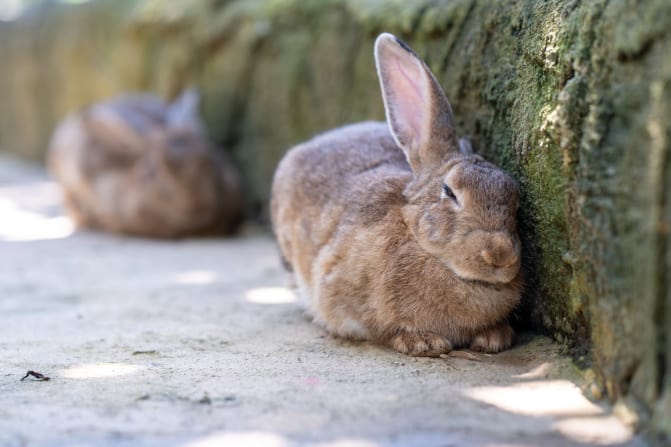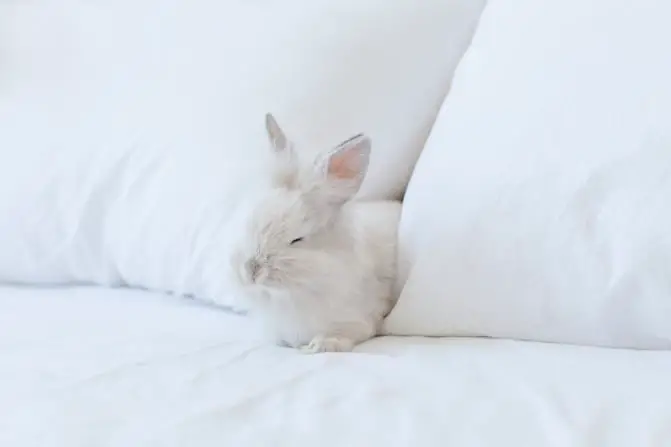How to know when a rabbit is sleeping? Knowing when a rabbit is sleeping is one of the most frequent concerns that rabbit owners have. It is challenging to determine when a rabbit is sleeping because they spend most of the time running and playing around or lying quietly with their eyes open.
If you have ever had a rabbit, then you know what we mean. The reality is that rabbits do sleep, but they do so very differently from other pets. Most rabbits sleep with their eyes open.
Unbelievable! No? But as incredible as it may seem, rabbits can achieve deep sleep even with their eyes open.
Why Do Some Rabbits Sleep With Their Eyes Open?
Let us remember that in nature, rabbits are animals of prey. They must always remain alert in case a predator approaches to attack them.
Due to a survival instinct, rabbits can sleep upright with eyes wide open to have plenty of time to jump up and escape. This behavior can mean the difference between surviving or being hunted by their predator.
Domestic rabbits that are not yet comfortable in their new homes can sleep with their eyes open. It will not be an easy task for you to watch them sleep for the first few weeks while getting used to their new environment. Once your rabbit establishes a strong bond with you and feels more at ease, it will be able to feel confident enough to sleep with its eyes closed. Even so, many will never do so.
If They Sleep With Their Eyes Open, How Come Their Eyes Don’t Get Dry?
Their eyes do not dry out because rabbits have numerous accessory tear glands and a third eyelid known as the nictitating membrane. The nictitating membrane’s function is to protect the eyeball from the environment’s aggressions and provide it with lubrication. Rabbits are not the only ones to have nictitating membranes. Many other animals possess these characteristics as well.
For How Long Can Rabbits Sleep?
If you have never seen your rabbit sleep, this is no reason to worry. As with all living beings, they also sleep, although their schedules are different from ours.
Rabbits usually sleep between 6 and 8 hours daily. Sometimes they can sleep up to 10 hours if they are in a calm and relaxed environment. They can also take small naps during the day.

At What Times Do Rabbits Prefer to Sleep?
Another concern that many people have when they first acquire a rabbit is knowing if their rabbit will stay up all night. There is a misconception that rabbits are nocturnal.
Bunnies are crepuscular animals, which means that they are most active during the evening (between 5 and 11 pm) and during the morning (between 4 and 9 am), when the sunlight is weak.
As expected, this is a behavior that is also related to their survival instinct, since, during these hours, night and day, predators have very little visibility. This instinct remains even in the pet rabbits.
So, we can say that the rabbits have two phases of sleep: the first one will be from the morning until the afternoon, and the second one is in the middle of the night. During the rest of the day, they can remain much more active, and these are the hours in which they take advantage to feed themselves. Between these phases and the various naps they take during the day, they complete their 8 hours of sleep.
Do Rabbits Need Darkness to Sleep?
Not at all. Rabbits can sleep in any situation as long as they feel comfortable with their surroundings. They can sleep peacefully in light or dark conditions.
They tend to be more active at dawn and dusk and tend to sleep more through the darkest part of the night and the brightest part of the day. That behavior is part of their circadian rhythm; they depend on sunlight to maintain their sleep patterns.
Any change that alters their normal rhythm or pattern, such as exposing them to conditions where there is too much light or too much darkness, can get them stressed and confused.
How Can You Tell If Your Rabbit Is Sleeping?
If your rabbit usually sleeps with its eyes open, it might be difficult for you to determine when it is asleep. Most likely, you have already seen it sleeping but have not noticed it. If this is the case, you will be glad to know that other signs will help you determine if your rabbit is asleep or awake:
- Sometimes, your rabbit may close its eyes or leave them half-open; obviously, this is a clear sign that your rabbit is sleeping.
- Their breathing pattern slows down when they are asleep.
- A bunny’s nose will stop moving or will move much less than when it is awake.
- Their ears will be more relaxed.
- If they fall into a deep sleep, they may twitch, and you may notice rapid and involuntary movements in their legs, ears, tail, mouth, or eyes. These movements occur more frequently when they are dreaming. Yes, bunnies can dream!
- Many rabbits can emit light and adorable snores.
- The vast majority adopt specific characteristic sleeping postures.
The more time you spend with your furry friend, the more you will learn to know your pet, and therefore the easier it will be for you to identify these signs.
Which Sleeping Postures Do Rabbits Prefer?
At bedtime, rabbits can adopt different postures. It all depends on your bunny’s personality, the degree of confidence they have, and if your house offers a calm environment. Generally, there are three leading positions which a rabbit can adopt when it goes to sleep:
- Loafing: This is one of the most common postures which rabbits adopt. When a bunny is loafing, it will hide its legs under its body and slick its ears back and look like a hairy loaf of bread. Loafing is a neutral position for a rabbit. Loafing is a comfortable position for a rabbit to flee away just in case it feels threatened. This position is also common to observe during the winter when it is colder.
- Bunny rug: in this position, the rabbit is lying down with its belly pressed on the ground and can have front and back legs stretched out. This position clearly shows that the rabbit is relaxed, confident, and ready to take a little nap. Loafing is also a commonly adopted position when the hot months arrive.
- Flopping: This is the position where the rabbits lie on their side. Many rabbit owners may become frightened when they see their rabbit lying on their sides for the first time because it looks like the rabbit is dead. As long as your pet rabbit keeps breathing, there is no need to worry. On the contrary, if you see your rabbit in the flopping position, it is time to celebrate, as this is a sign that your rabbit feels completely safe. It is like having reached the maximum level of confidence.
Some people tend to lay their rabbits on their backs and brag about putting their rabbits into a trance. Rabbits do not like to sleep on their backs, as this makes them vulnerable to predators. Never force your rabbit or allow anyone to lay your rabbit on its back because a trance is nothing more than your rabbit having entered a state of panic.
Can I Sleep With My Pet Rabbit?
Unless you do not want to wake up every morning at 4:00, do not get the habit of sleeping with your rabbit, at least during the nighttime. Rabbits are very playful animals and may wake you up several times at dawn because, just as they do not sleep all day, they do not sleep all night. They may want to eat, drink water, run, play at dawn so that they will not remain quiet.

If you do not want to lock it in a cage, you can leave it loose, but if you wish to sleep peacefully, we do not recommend having your bunny in the same room where you are sleeping. A normal bed is not necessarily what they will find most comfortable, they have their own taste for sleeping environment and bedding.
Sudden Changes in Your Rabbit’s Sleeping Patterns
Over time, you will learn to understand your rabbit’s language, and you will be able to notice and get used to your furry pet’s schedule. Soon, you will be ready to distinguish if there have been changes in behavior or sleeping pattern.
Having developed this knowledge is essential because sometimes determining these changes can be crucial in diagnosing some medical conditions. For example, if you notice that your rabbit is sleeping too much, not enough, or at the wrong times, it may be a sign of illness or stress. Rabbits in pain often have difficulty resting or sleeping. If your rabbit is not sleeping enough or is sleeping too much, it can sign a medical problem. Do not hesitate to visit your vet immediately.
In Conclusion
Because rabbits are such distrustful animals, you will be able to watch them sleeping with their eyes open most of the time, but if you get your bunny to sleep with eyes closed and close to you, it means that it already trusts you and feels comfortable with your presence.
Sometimes this can take several months or years to achieve. Meanwhile, you should ensure that your rabbit has a private and safe place to take refuge and sleep peacefully.

